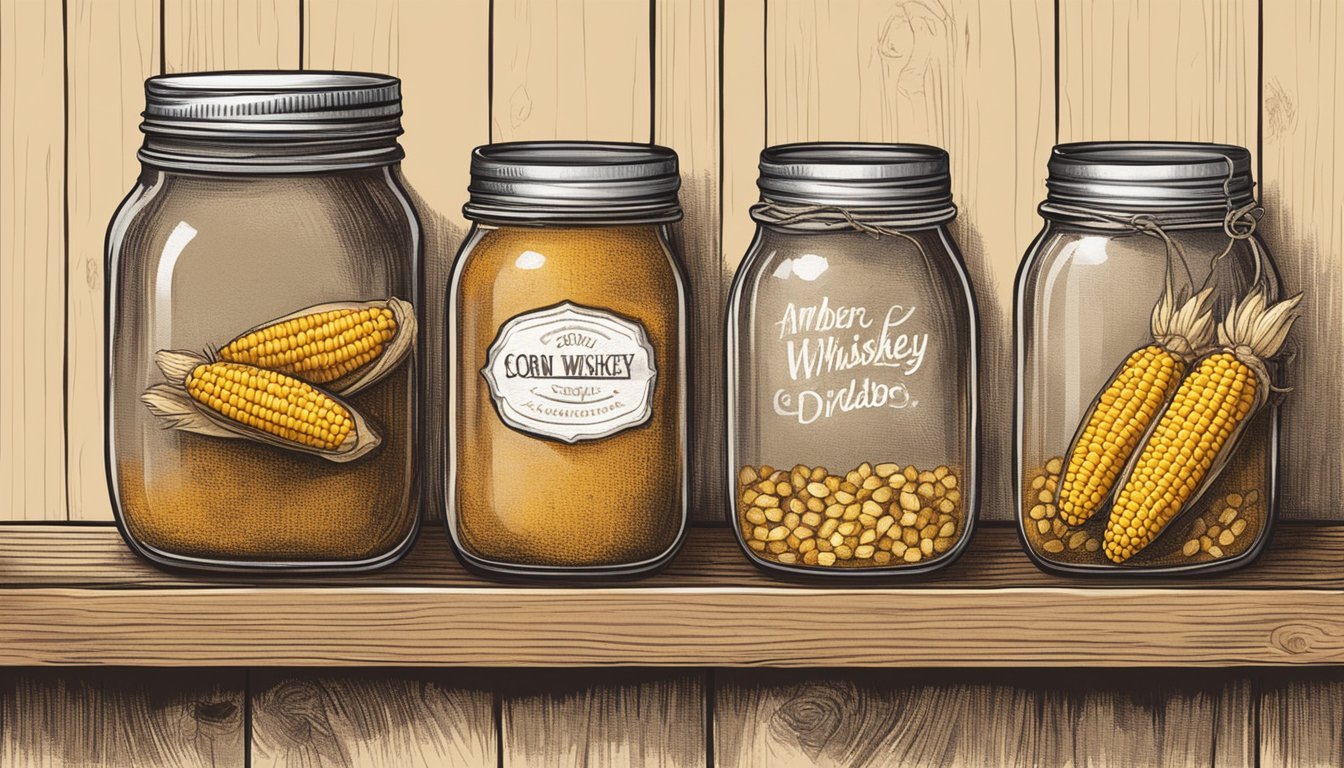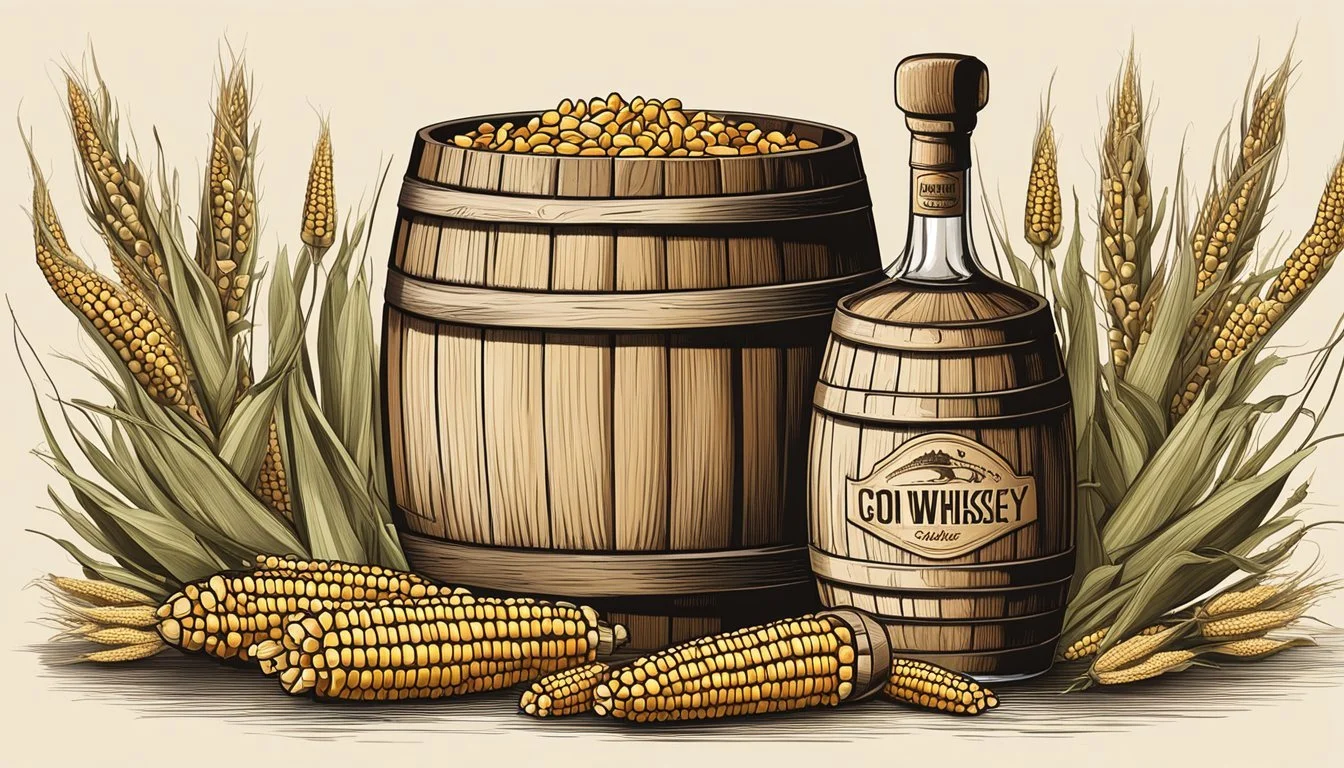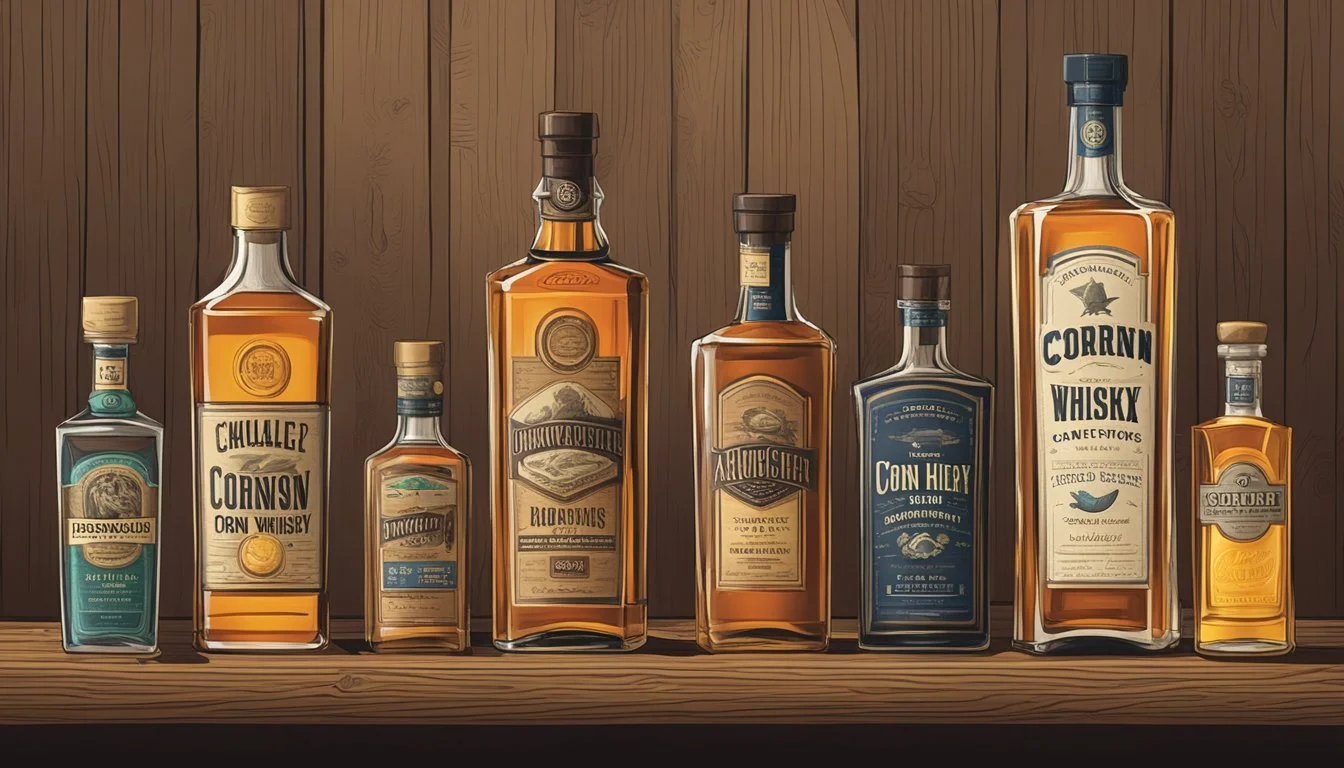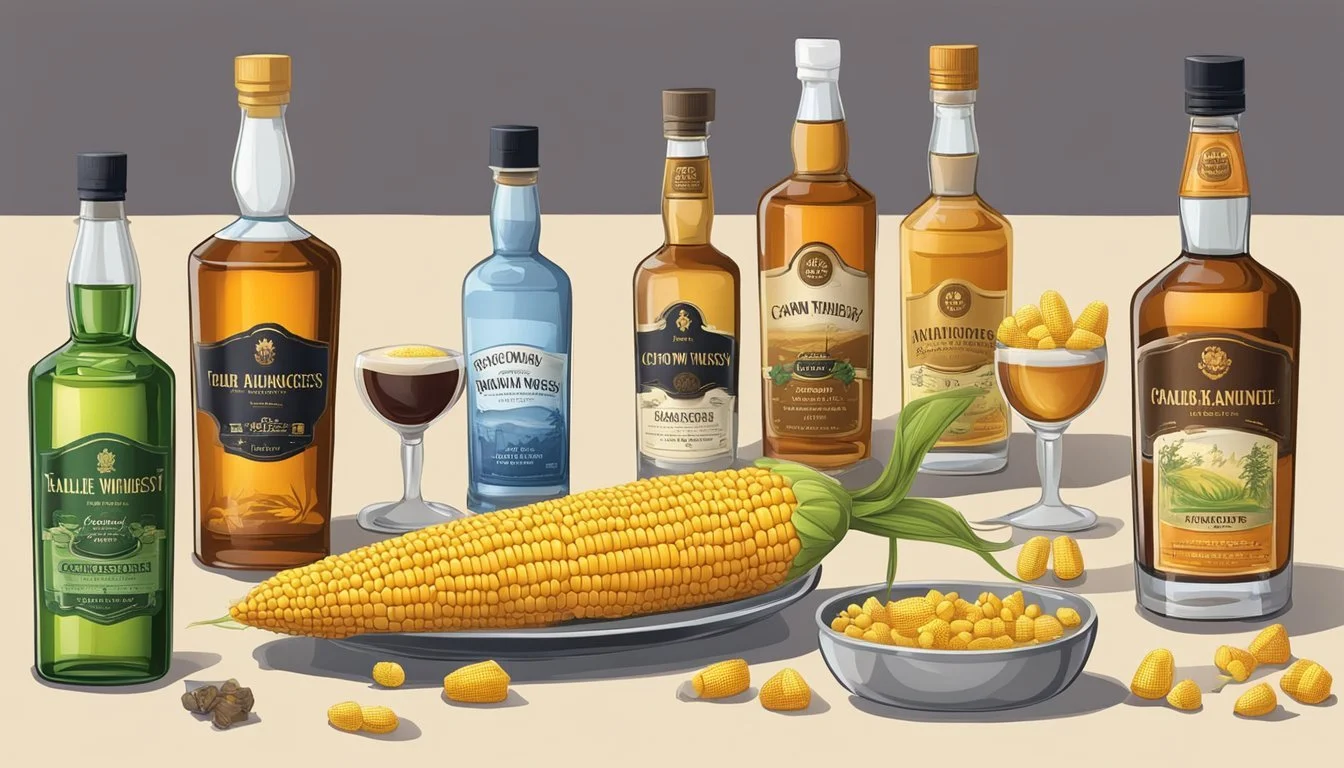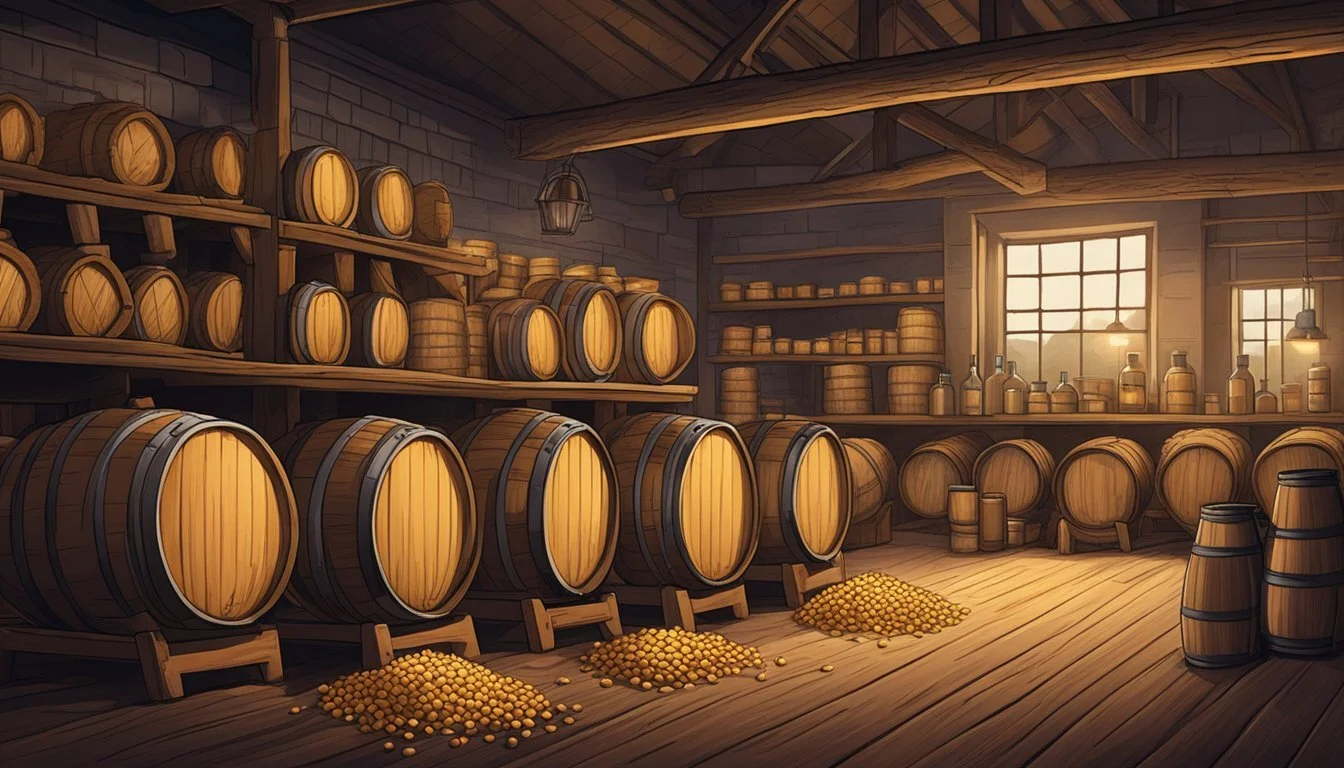Corn Whiskey Substitutes
Best Alternatives for Your Recipes
When it comes to enjoying or cooking with whiskey, sometimes alternatives are necessary due to availability, preference, or dietary restrictions. Using substitutes for corn whiskey can provide equally exciting and diverse flavor profiles. While corn whiskey offers a unique spicy yet creamy taste due to its corn mash bill and long-lasting light buttery notes, there are versatile alternatives that can deliver similar experiences.
Apple juice, for instance, can mimic the sweetness and fruitiness reminiscent of some corn whiskey notes, making it an excellent option for both cooking and drinks. On another note, using non-alcoholic substitutes like ginger ale or cola can help bring out the complexity in recipes while maintaining the necessary balance. Additionally, Old Tom gin combined with various syrups and citrus juices can be crafted into delicious whiskey-like beverages.
Understanding these substitutes not only offers convenience but also opens up a world of culinary and mixology creativity. Whether you are preparing a sophisticated cocktail or a hearty meal, having the right substitute for corn whiskey can ensure that you never miss out on rich, enticing flavors.
Understanding Corn Whiskey
Corn whiskey, distinct in its production and flavor profile, is a unique subset of American whiskey. This section breaks down what defines corn whiskey, how it is made, and the notable flavor characteristics that set it apart.
Defining Corn Whiskey
Corn whiskey must contain at least 80% corn in its mash bill. This high corn content differentiates it from Bourbon, which requires a minimum of 51% corn.
Corn whiskey is typically less regulated regarding aging. Unlike Bourbon, which is aged in new charred oak barrels, corn whiskey can be unaged or aged in uncharred or used barrels, leading to a different flavor profile.
Corn Whiskey Distillation Process
The distillation process of corn whiskey starts with mashing the corn along with other grains. The mixture is then heated to convert starches to sugars, which are subsequently fermented.
Fermentation leads to a low-alcohol mixture, which is then distilled. The distillation often uses simple pot stills, resulting in a spirit that retains the rich, grainy profile of the corn.
The final step determines whether the whiskey will be aged. Unaged corn whiskey is bottled straight from the still, while aged versions are stored in uncharred or used oak barrels.
Key Characteristics of Corn Whiskey Flavor
Corn whiskey exhibits a distinctive flavor profile primarily influenced by its high corn content. The dominant flavors often include sweet corn, honey, and a notable graininess.
Due to the mash bill and distillation methods, there may also be undertones of butterscotch and cinnamon, especially if aged. Unaged corn whiskey, sometimes referred to as "white dog," has a raw, potent flavor, while aged versions develop complexities over time.
The use of uncharred barrels means aged corn whiskey lacks the heavy vanilla and caramel notes of Bourbon, providing a lighter, more robust corn flavor.
By focusing on these essential aspects, one gains a comprehensive understanding of what distinguishes corn whiskey, from its production to its unique taste profile.
Popular Corn Whiskey Brands
Two notable brands in the corn whiskey industry are Heaven Hill and Mellow Corn, each with distinct characteristics, production methods, and unique appeal to whiskey enthusiasts.
Heaven Hill
Heaven Hill stands out for its robust history and quality craftsmanship in the whiskey industry. Founded in 1935, this distillery is known for producing several iconic spirits, including corn whiskey.
Heaven Hill's corn whiskey is lauded for its adherence to traditional methods. The whiskey is crafted with a high percentage of corn, which imparts a characteristic sweetness. The distillation process ensures a smooth finish, making it a favorite among both novices and seasoned whiskey drinkers.
The brand prides itself on quality control, ensuring each bottle maintains a consistent flavor profile. This reliability has garnered a loyal customer base. Heaven Hill’s offerings are often reasonably priced, making them accessible while still delivering a rich whiskey experience. Other notable products from Heaven Hill include Elijah Craig and Evan Williams, further demonstrating their expertise in whiskey production.
Mellow Corn
Mellow Corn is another distinguished name in the corn whiskey realm, produced by Heaven Hill Distillery. Known for its bold profile and affordability, Mellow Corn is a straight corn whiskey that adheres to strict regulatory guidelines. It must contain at least 80% corn and be aged in used bourbon barrels, which contribute to its unique character.
This whiskey is characterized by its bright, gold color and robust, sweet flavor. The aging process in used barrels ensures that the corn’s natural sweetness is balanced with a slight spicy note, making it versatile for both sipping and mixing in cocktails.
Mellow Corn's distinct yellow label and old-fashioned bottle design make it easily recognizable. It is often praised for its value, offering a quality drinking experience at a budget-friendly price point. The strong corn flavor appeals to traditionalists and those looking for a whisky with a bit more intensity.
These attributes make Mellow Corn a staple for those who appreciate authentic American whiskey craftsmanship.
Corn Whiskey Substitutes
Corn whiskey can be replaced by various other types of whiskey, each providing distinct flavors and characteristics. Options include bourbon, rye whiskey, scotch, and international alternatives like Canadian and Japanese whiskies.
Bourbon As a Substitute
Bourbon is a popular substitute for corn whiskey due to its similar base ingredient: corn. Legally, bourbon must consist of at least 51% corn, which gives it a sweet flavor profile that closely mirrors that of corn whiskey.
Bourbon is often aged in new charred oak barrels, which imparts vanilla, caramel, and oak notes. These qualities can add an extra layer of complexity to cocktails or recipes needing a corn whiskey replacement. When substituting bourbon, opt for those with higher corn content for a closer flavor match.
Rye Whiskey Alternatives
Rye whiskey offers a spicier alternative to corn whiskey. Unlike corn-based whiskies, rye whiskey must consist of at least 51% rye grain. This gives it a distinctive, bold flavor with spicy, fruity, and sometimes peppery notes.
Rye whiskey can substitute corn whiskey in cocktails requiring a robust flavor. For example, drinks like the Manhattan or Old Fashioned can benefit from rye's spiced profile. As a result, rye whiskey is a versatile replacement, particularly when a sharper taste is desired.
Using Scotch for Similar Complexity
Scotch whisky offers a different kind of complexity compared to corn whiskey. Made primarily from malted barley and aged for a minimum of three years, scotch can bring a range of flavors, from light and floral to rich and smoky.
Substituting scotch whisky for corn whiskey introduces diverse taste dimensions. Blended scotch works well in cocktails, offering a balanced and approachable flavor. Single malt scotch, with its nuanced profile, can enhance savory recipes by adding depth and sophistication.
International Whiskey Alternatives
International whiskies, such as Canadian and Japanese varieties, provide unique alternatives to corn whiskey. Canadian whisky, often using a mix of grains, is known for its smoothness and light flavor, making it an excellent option for a less intense substitution.
Japanese whisky, inspired by Scottish methods, often features delicate and refined notes. These whiskies can be used to replace corn whiskey in both drinks and culinary applications. Their balanced character allows them to blend seamlessly, enhancing the recipe without overpowering other ingredients.
Non-Alcoholic Whiskey Substitutes
Non-alcoholic whiskey substitutes have become an essential choice for those looking to enjoy the flavors of whiskey without the alcohol content. These alternatives offer a variety of options in terms of taste, texture, and quality.
Taste and Texture of Non-Alcoholic Spirits
Non-alcoholic spirits aim to mimic the complex flavors of traditional whiskey. The taste often includes hints of caramel, vanilla, and oak, similar to their alcoholic counterparts.
The texture can vary greatly. Some brands offer a velvety smoothness, while others may have a slight burn, even without alcohol.
The aroma is also crucial, as it contributes to the overall sensory experience. Quality non-alcoholic whiskeys will have a rich and inviting scent.
Brands of Non-Alcoholic Whiskey
Several brands have made a name for themselves in the non-alcoholic whiskey market.
Ritual Zero Proof Whiskey is well-regarded for its ability to replicate the spirit's flavor profile.
Lyre’s American Malt offers a taste reminiscent of traditional Scotch, emphasizing caramel and oak flavors.
Seedlip and Spiritless Kentucky 74 provide other excellent options, each with distinct characteristics that cater to different palates.
DIY Non-Alcoholic Whiskey Alternatives
Creating DIY non-alcoholic whiskey alternatives can be simple and satisfying.
Vanilla extract and molasses can be used to achieve a similar sweetness and depth found in whiskey.
Apple cider vinegar can provide a slight burn, while apple juice and a splash of lemonade add complexity.
For cocktails like a non-alcoholic Manhattan, these DIY methods can be cost-effective and customizable.
Experiment with natural ingredients to find the perfect balance that suits individual tastes.
Understanding the nuances of non-alcoholic whiskey substitutes can help in making informed choices for those who prefer zero-proof spirits while still enjoying the essence of traditional whiskey.
Cocktails and Mixers
When seeking substitutes for corn whiskey, it is essential to consider how these alternatives will perform in various cocktails and mixers. Options range from classic cocktail recipes to inventive non-alcoholic mocktails.
Classic Whiskey Cocktails With Substitutes
Old Fashioned: This timeless cocktail can be made using alcohol-free whiskey alternatives. Mix the substitute with dashes of bitters, a sugar cube, and a twist of orange zest.
Manhattan: For a non-alcoholic version of this sophisticated drink, combine a spirit substitute with non-alcoholic sweet vermouth and bitters to maintain the complex flavor profile.
Boulevardier: Substitute whiskey with a whiskey alternative mixed with non-alcoholic sweet vermouth and campari. This retains the drink's characteristic bitterness and sweetness balance.
Refreshing Mixers to Complement Whiskey Flavors
Lime and Ginger Beer: Mix a whiskey substitute with fresh lime juice and ginger beer for a refreshing combination that mimics the spiciness and zest of whiskey cocktails.
Apple Juice: Adding apple juice to a whiskey alternative introduces a sweet and fruity element, reminiscent of some whiskey notes, while keeping the drink balanced.
Hot Toddy: Use a whiskey substitute mixed with hot water, honey, lemon, and spices to create a warming beverage perfect for cooler months.
Mocktails: Non-alcoholic Cocktail Creations
Non-Alcoholic Whiskey Sour: Combine a whiskey alternative with lemon juice and simple syrup. Shake well and serve over ice to replicate the tart and sweet flavors of a traditional Whiskey Sour.
Booze-Free Old Fashioned: Replace whiskey with a spirit substitute. Mix with sugar, bitters, and a bit of orange zest to capture the essence of a classic Old Fashioned.
No-Alcohol Manhattan: For a mocktail Manhattan, combine a whiskey substitute with non-alcoholic sweet vermouth and a few dashes of bitters. Serve in a chilled cocktail glass with a maraschino cherry.
These substitutions offer a variety of options for those avoiding alcohol, ensuring that the flavors and experiences of whiskey cocktails can still be enjoyed.
Whiskey Pairing and Flavor Enhancement
When exploring whiskey pairings and how to enhance its flavors, attention to detail can elevate the tasting experience. Pairing whiskey with the right food or using specific ingredients can enhance its natural notes, creating a more complex and enjoyable profile.
Pairing Whiskey With Food
Pairing food with whiskey requires an understanding of the whiskey's flavor profile. A smoky Scotch, for example, pairs well with rich, savory dishes like smoked meats or BBQ ribs.
Whiskey with vanilla and caramel notes, like bourbon, complements desserts such as chocolate cake or caramel flan. These combinations enhance the sweetness and depth of the whiskey.
For fruitier whiskeys, pair with dishes that include apple or citrus. Apple cider pork chops or a citrus salad can highlight the whiskey's fruity notes. The balance in these pairings elevates the culinary experience.
Enhancing Whiskey Flavor Profiles
Enhancing whiskey’s flavor involves using ingredients that complement its natural tasting notes. Common choices include apple cider, honey, and ginger ale. Ginger ale, for instance, can bring out spicy notes in whiskey, making it more vibrant.
Syrups and extracts play a crucial role. Honey syrup can add a smooth sweetness, while ginger syrup introduces a spicy kick. Oak barrels contribute flavors like oak, caramel, and vanilla.
Combining whiskey with nonalcoholic beverages like grape juice can provide unique flavors without overpowering the primary profile. Using fresh ingredients like candy corn or citrus slices can add layers of complexity to the whiskey’s spiciness and sweetness.
Cultural Impact of Whiskey
Whiskey has left an indelible mark on various aspects of society, from shaping significant historical events to being a central element in popular culture. Its influence spans generations and continues to be celebrated by enthusiasts worldwide.
Whiskey in Popular Culture
Whiskey has become a symbol of sophistication and rebellion in literature, film, and music. In literature, it’s portrayed in works by authors such as Ernest Hemingway and F. Scott Fitzgerald. Films often use whiskey to define characters' personalities or to set a particular tone, like in Mad Men and James Bond movies.
In music, whiskey is frequently mentioned in country and blues songs, signifying both celebration and sorrow. Bands like Pabst Blue Ribbon have even included whiskey references in their lyrics. This continued representation solidifies whiskey’s status as a cultural icon.
The Role of Whiskey in Historical Events
Whiskey has significantly influenced historical events, especially in America. During Prohibition in the 1920s, the illegal production and distribution of whiskey, often referred to as moonshine, increased dramatically. This period highlighted the resilience and creativity of the whiskey industry despite stringent laws.
Whiskey also played a role in the American Revolution, where a whiskey tax led to the Whiskey Rebellion. This event was crucial in testing the new United States’ federal authority. The beverage’s production and consumption have often mirrored societal changes, making it a focal point in American history.

